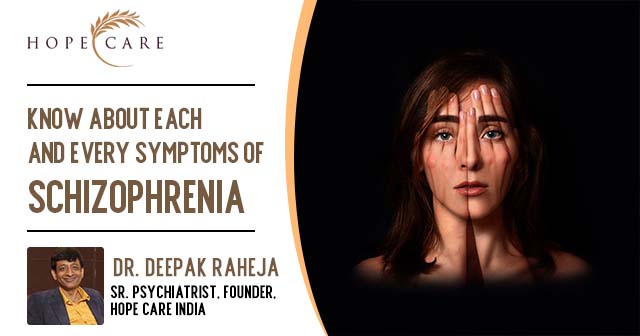Schizophrenia is perhaps the most stigmatized and misunderstood psychological disorder of all. Though no reason as such is identified behind this, most psychologists believe that this has happened because of the rareness of this disorder among people. Now with the evolution of medical science and psychology, doctors can identify the symptoms of schizophrenia and how to diagnose this condition along with the best treatment. But in the 80s or 70s schizophrenia was the prime concern in the media, doctor’s offices more than any other mental illness. As a result, back then, the people who were schizophrenic were often abused and locked up in their homes. This information is provided by the psychologists for the best schizophrenia treatment in Delhi.

The word Schizophrenia refers to ‘split mind’. But ironically in this condition, there is no split in mind or personality which happens in other mental illnesses like dissociative identity disorder or personality disorder. The term ‘schizophrenia’ actually is ‘split from reality. Only 1.1% of the population over the age of 18 suffers from Schizophrenia that is 51 million people worldwide. One out of ten people with Schizophrenia take their own life and another four out of ten attempt suicide at least once. According to the best doctor for depression in Delhi, college students who are suffering from schizophrenia are also diagnosed with depression, and therefore many times they experience suicidal thoughts.

It can last for a long time, some psychologists even call it chronic. Schizophrenia usually is visible in males in their mid-20s, and in females, it occurs in their late 20s. Its symptoms become visible gradually but events like childhood trauma or stress can trigger the onset of Schizophrenia. The peak age to have a schizophrenic break is early adulthood. Although psychologists around the world have identified no event which is directly responsible for causing it. Schizophrenia was once thought to be a single condition with some symptoms but it is now, included in the DSM-5 (American Psychiatric Association’s Diagnostic And Statistical Manual Of Mental Disorders) as a point on a spectrum of disorders that are different from each other in factors like how they’re expressed and how long they last in a patient.

When schizophrenia is in full swing and symptoms are extreme, the person who is schizophrenic is not able to differentiate whether or not his ideas and his belief system are real. Hospitals and clinics offering the best schizophrenia treatment in Delhi have been diagnosing patients based on the below-listed symptoms.
Positive Symptoms: Positive symptoms include distorted thoughts, behaviors, and perception which showcases the person’s inability to differentiate between what is real and what is false. The term “positive” refers to the appearance of something new, instead of the absence of their original practices.

- Hallucinations: Schizophrenics can hear, see, sense, or feel stuff that isn’t actually happening in real life. Hallucinations can of different types:
- Auditory Hallucinations: In most cases, the individual hears voices in their mind. They should be enraged or in a hurry and demand that they complete tasks. They speak in low pitch, sort of a whisper, or can be irritated and loud at times
- Visual Hallucinations: It is possible to see lights, artifacts, individuals, or patterns. Perceiving range and depth may also be a problem for them.
- Delusions: The majority of individuals consider these viewpoints odd, and they are ready to refute them. The individual who is afflicted may believe that the Federal government is chasing them or that someone is attempting to control their brain via TV. They may feel they are someone else, such as a famous person or the emperor, or they may think they have supernatural skills.
- Distracted or disorganized thoughts: It might be challenging for people with schizophrenia to organize their ideas. They might not be able to understand when we communicate with them. If anything, they may look to be drowsy or perplexed. Their phrases can be garbled and incoherent when they talk
- Movement Disorder: Schizophrenic people may seem jittery. They’ll perform the same actions or tasks repeatedly. However, they can also stay still for several hours straight, which is referred to as catatonic by experts. Schizophrenic people do not behave aggressively at all.
Negative Symptoms: The lack of regular activities of the brain which involve thinking, expressing, and perceiving is referred to as negative symptoms.
- Showing no signs of Happiness: The individual who is suffering from schizophrenia no longer seems to enjoy life or live to the fullest of his abilities. This is referred to as anhedonia by psychologists.
- Speech difficulties: Schizophrenic people cannot express their emotions or internal turmoil. This is referred to as alogia. They do not speak much or speak often which anyone.
- Schizophrenic patients may appear to be suffering from losing their train of thought often. When they talk, their voices can sound flat and without any emotions. They can not laugh or express usual facial emotions in answer to interactions or events that are happening around them. This is what a psychologist would deem as affective flattening.
- Withdrawal from society: Having no plans with the friends or interest in them or becoming a total hermit are some of the instances. Trying to hold a conversation with the schizophrenic person can be tiresome and feel like nails on a chalkboard. Getting an answer from them can be very difficult. Psychologists call this as ‘apathy’.
- No follow-through: Patients who are schizophrenic have a hard time following a timetable or a routine. They cannot finish a task which they started. They might be not able to begin at all. This is what a psychologist would refer to as avolition.

Cognitive Symptoms: Memorization can be a challenge for anyone with schizophrenia. They might not be able to make sense of several types of information at one time such as a phone number and directions. They can struggle to organize their thoughts and make decisions.

Hope Care established under the guidance of Dr. Deepak Raheja, is a Psychiatric Centre of excellence that endeavors to restore hope and well-being to individuals and families afflicted by mental ill-health through comprehensive treatment and rehabilitation services. Hopecare seeks to set benchmarks in innovative programs in treatment, care, and education.


Well researched and written! Glad to read what was happening behind the shocking headlines
what is alogia